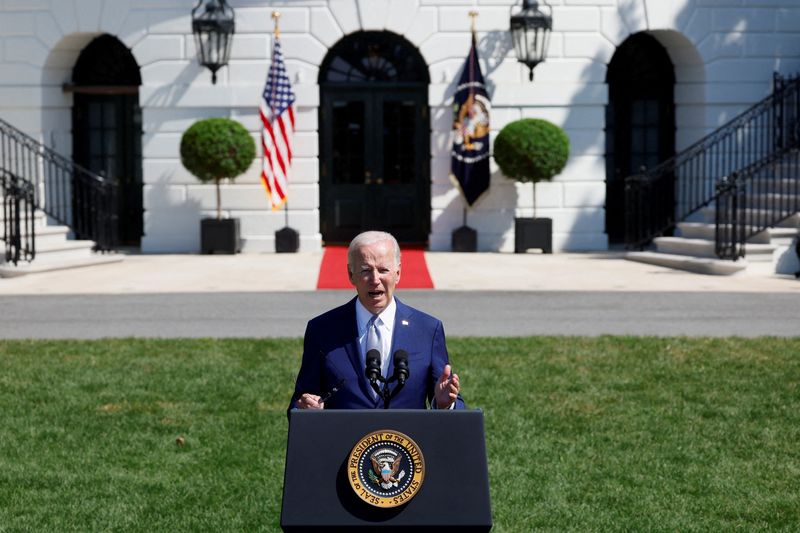By Stephen Nellis, Karen Freifeld and Alexandra Alper
(Reuters) - The Biden administration published a sweeping set of export controls on Friday, including a measure to cut China off from certain semiconductor chips made anywhere in the world with U.S. equipment, vastly expanding its reach in its bid to slow Beijing's technological and military advances.
The rules, some of which take immediate effect, build on restrictions sent in letters this year to top toolmakers KLA Corp, Lam Research Corp (NASDAQ:LRCX) and Applied Materials Inc (NASDAQ:AMAT), effectively requiring them to halt shipments of equipment to wholly Chinese-owned factories producing advanced logic chips.
The raft of measures could amount to the biggest shift in U.S. policy toward shipping technology to China since the 1990s. If effective, they could hobble China's chip manufacturing industry by forcing American and foreign companies that use U.S. technology to cut off support for some of China's leading factories and chip designers.
"This will set the Chinese back years," said Jim Lewis, a technology and cybersecurity expert at the Center for Strategic and International Studies (CSIS), a Washington D.C.-based think tank, who said the policies harken back to the tough regulations of the height of the Cold War.
"China isn't going to give up on chipmaking ... but this will really slow them (down)."
In a briefing with reporters on Thursday previewing the rules, senior government officials said many of the measures were aimed at preventing foreign firms from selling advanced chips to China or supplying Chinese firms with tools to make their own advanced chips. They conceded, however, that they had not secured any promises that allied nations would implement similar measures and that discussions with those nations are ongoing.
"We recognize that the unilateral controls we're putting into place will lose effectiveness over time if other countries don't join us," one official said. "And we risk harming U.S. technology leadership if foreign competitors are not subject to similar controls."
The expansion of U.S. powers to control exports to China of chips made with U.S. tools is based on a broadening of the so-called foreign direct product rule. It was previously expanded to give the U.S. government authority to control exports of chips made overseas to Chinese telecoms giant Huawei Technologies Co Ltd and later to stop the flow of semiconductors to Russia after its invasion of Ukraine.
On Friday, the Biden administration applied the expanded restrictions to China's IFLYTEK, Dahua Technology, and Megvii Technology, companies added to the entity list in 2019 over allegations they aided Beijing in the suppression of its Uyghur minority group.
The rules published on Friday also block shipments of a broad array of chips for use in Chinese supercomputing systems. The rules define a supercomputer as any system with more than 100 petaflops of computing power within a floor space of 6,400 square feet, a definition that two industry sources said could also hit some commercial data centers at Chinese tech giants.
Eric Sayers, a defense policy expert at the American Enterprise Institute, said the move reflects a new bid by the Biden administration to contain China's advances instead of simply seeking to level the playing field.
"The scope of the rule and potential impacts are quite stunning but the devil will of course be in the details of implementation," he added.
Companies around the world began to wrestle with the latest U.S. action, with shares of semiconductor manufacturing equipment makers falling.
The Semiconductor Industry Association, which represents chipmakers, said it was studying the regulations and urged the United States to "implement the rules in a targeted way - and in collaboration with international partners - to help level the playing field."
Earlier on Friday, the United States added China's top memory chipmaker YMTC and 30 other Chinese entities to a list of companies that U.S. officials cannot inspect, ratcheting up tensions with Beijing and starting a 60 day-clock that could trigger much tougher penalties.
Companies are added to the unverified list when U.S. authorities cannot complete on-site visits to determine if they can be trusted to receive sensitive U.S. technology, forcing U.S. suppliers to take greater care when shipping to them.
Under a new policy announced on Friday, if a government prevents U.S. officials from conducting site checks at companies placed on the unverified list, U.S. authorities will start the process for adding them to the entity list after 60 days.
Entity listing YMTC would escalate already-rising tensions with Beijing and force its U.S. suppliers to seek difficult-to-obtain licenses from the U.S. government before shipping them even the most low-tech items.
The new regulations will also severely restrict export of U.S. equipment to Chinese memory chip makers and formalize letters sent to Nvidia (NASDAQ:NVDA) Corp and Advanced Micro Devices Inc (NASDAQ:AMD) restricting shipments to China of chips used in supercomputing systems that nations around the world rely on to develop nuclear weapons and other military technologies.
Reuters was first to report key details of the new curbs on memory chip makers, including a reprieve for foreign companies operating in China and the moves to broaden restrictions on shipments to China of technologies from KLA, Lam, Applied Materials, Nvidia and AMD.
South Korea's industry ministry said in a statement on Saturday there would be no significant disruption to equipment supply for Samsung (KS:005930) and SK Hynix's existing chip production in China.
However, it was necessary to minimise uncertainty through consultation with U.S. export control authorities, it added.
China's commerce ministry said in a statement on Monday that it firmly opposes the U.S. move as it hurts the normal trade and economic exchange between companies in the two countries and threatens the stability of global supply chains.

"The U.S. should stop the wrongdoings immediately and give fair treatment to companies from all over the world, including Chinese companies."
On Saturday, China's foreign ministry spokesperson Mao Ning called the move an abuse of trade measures designed to reinforce the United States' "technological hegemony".